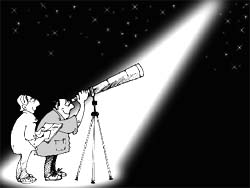New face
 in 1995, when astronomers "discovered' an extrasolar planet orbiting the star 51 Pegasi, it was considered to be a scientific breakthrough. Since then, at least 30 extrasolar planets have been discovered. Invariably, their presence is deduced from the tiny gravitational effect that they have on the orbit of the parent star. But now, a team of British astronomers claims to have directly observed light reflected from such a planet. If this claim is confirmed, it will be the first time we will be able to directly observe a whole new world outside our own solar system.
in 1995, when astronomers "discovered' an extrasolar planet orbiting the star 51 Pegasi, it was considered to be a scientific breakthrough. Since then, at least 30 extrasolar planets have been discovered. Invariably, their presence is deduced from the tiny gravitational effect that they have on the orbit of the parent star. But now, a team of British astronomers claims to have directly observed light reflected from such a planet. If this claim is confirmed, it will be the first time we will be able to directly observe a whole new world outside our own solar system.
Extrasolar planets were usually considered too small to be seen directly. So their presence is inferred by the wobble that they induce on the orbit of the star they circulate (orbit). This tiny motion induces a Doppler shift in the frequency of the light emitted by the star. Doppler shift is the change in frequency when waves are emitted by an object in motion, like an approaching train. This gravitational effect means that the only planets we can detect are ones which are very massive and very close to the star.
Now, A C Cameroon and his colleagues at the University of St Andrews, Scotland, have reported seeing reflected light from a planet orbiting the nearby star Tau Bootis. The planet itself was discovered in 1997 and was thought to be at least four times the mass of Jupiter. It orbits the star once in three days. It is also much closer to the star than Mercury is to the Sun. This means that it reflects a lot of light and is a potential candidate for direct detection ( Nature , Vol 402, No 6763).
The researchers claim thay detected the planet by exploiting the very different Doppler shift in the two signals, whose sources are moving in different directions. They deduce that the planet is about eight times the mass of Jupiter and nearly twice its size and appears to be bluish green. However, scientists at Harvard University, usa, who recently conducted a study, were unable to find any sign of reflected planetary light in the starlight of Tau Bootis. Thus, other astronomers are likely to be cautious about the new results unless they can be independently confirmed.
Related Content
- Order of the National Green Tribunal regarding endangered feral horses in Dibru-Saikhowa National Park, Assam, 16/12/2024
- Order of the National Green Tribunal regarding the presence of a garbage receptacle point/dhalao near a blind school, Delhi, 29/11/2024
- Order of the National Green Tribunal regarding pharmaceutical-induced environmental contamination, 06/05/2024
- The energy transition in Africa: Opportunities for international collaboration with a focus on the G7
- Climate risks to nine key commodities: protecting people and prosperity
- Regional economic outlook for Asia and Pacific: steady growth amid diverging prospects
